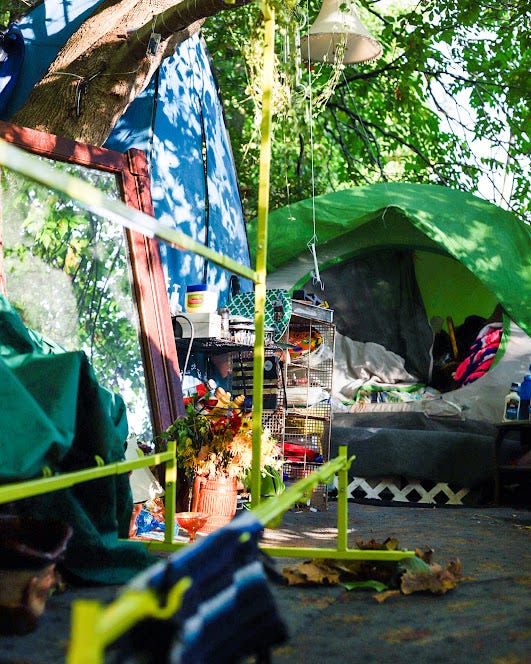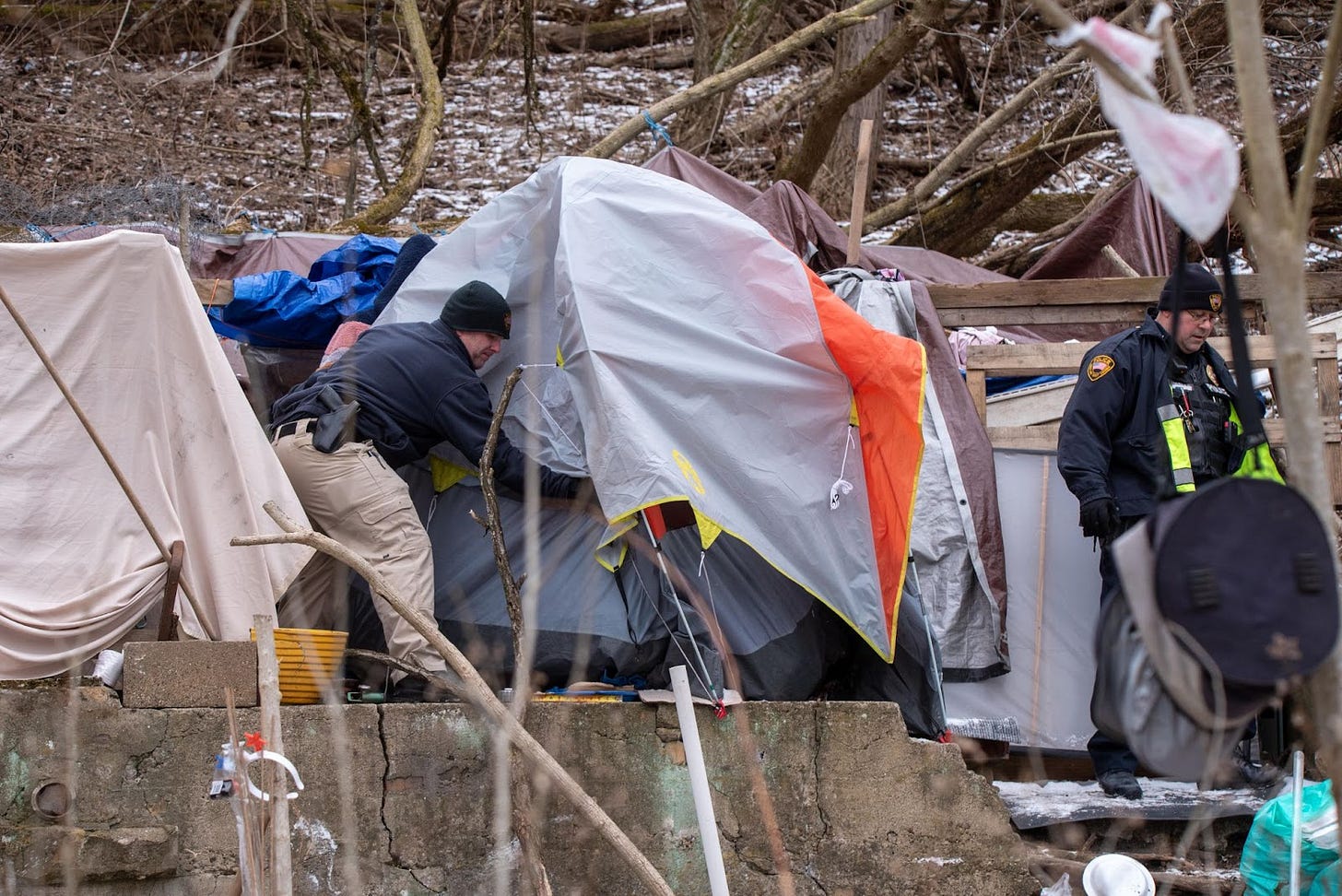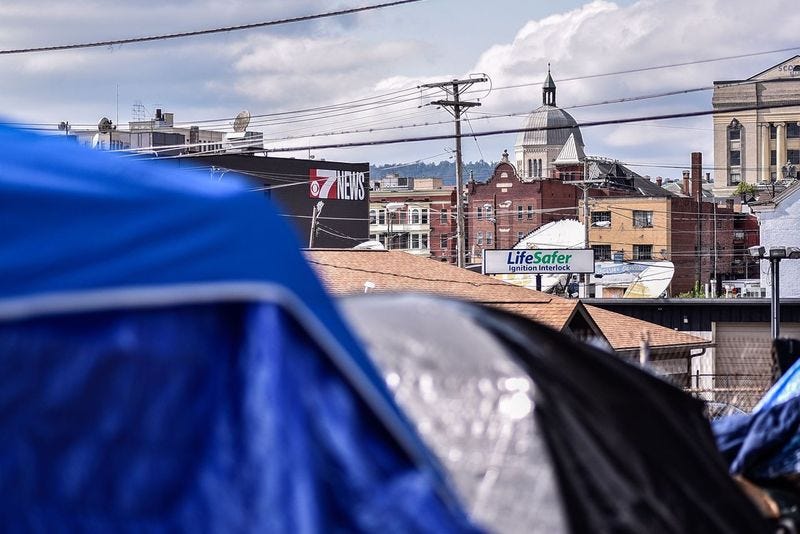W.Va. House, Senate introduce statewide sleeping bans
The proposed bills would ban the act of sleeping or camping on public property and could impose fines, jail time or see those in violation offered one way bus tickets outside of the state.
CHARLESTON – Two bills seeking to ban sleeping, storing personal belongings and cooking on public property in the state of West Virginia were introduced by members of the House of Delegates and state Senate Feb. 14 and Feb. 12, respectively. The bills would impose fines or jail time on those in violation.

House Bill 2382, introduced by Del. Gino Chiarelli (R-Monongalia) and sponsored by local Del. Jimmy Willis (R-Brooke), among others, would amend W.Va. Code §61-6-18, Crimes Against the Peace, adding public property to a provision banning sleeping or camping on the state Capitol Complex.
“It is unlawful for any person for any person to camp in or to store personal property, including camp facilities and camp paraphernalia…[on] any street, park or trail; or any public property, improved on unimproved,” the proposed legislation reads.
On a first offense, a warning would be issued and a recommendation made to seek alternate shelter or obtain assistance. On a second offense, a fine of not more than $200 would be imposed. On a third and each subsequent offense, a fine of not more than $500 and/or jail sentence of not more than 30 days would be imposed. If charged, violation of the proposed legislation would be considered a misdemeanor.
Senate Bill 134, sponsored by Sen. Eric Tarr (R-Putnam), reads similar to its sister bill in the House.

Fines imposed under SB 134 range from no less than $100 to no more than $1,000, or 40 hours of community service, as opposed to HB 2382 lower maximum threshold and potential jail time. On a first offense, an individual would be offered a “one way bus ticket, at no cost, to…Atlanta, Denver, Detroit, Chicago, New York, or the District of Columbia.”
A majority of those experiencing homelessness in West Virginia are from here, despite commonly-used talking points claiming otherwise.
These bills come as municipalities across the state of West Virginia have adopted sleeping bans in their cities and towns.
As of publication, the cities of Bluefield, Clarksburg, Huntington, Parkersburg, Wheeling and Westover have bans prohibiting sleeping, camping, storing personal belongings or cooking on public property. The city of Morgantown adopted a sleeping ban in September 2024, but a grassroots petition paused enforcement and sent the issues to voters for their approval or rejection during the city’s April 2025 municipal election.
In June 2024, the Supreme Court of the United States empowered cities to ban sleeping and urban camping, including the imposition fines and jail time, on public property in their 6-3 decision in Grants Pass v. Johnson. Prior to the ruling, a 2018 order by the Ninth Circuit Court of Appeals ruled that west coast cities could not enforce their bans unless adequate, available shelter beds were made available.
The SCOTUS held that sleeping bans do not target a person’s “status,” or innate characteristic. Rather, the conservative majority said the bans prohibit “actions undertaken by a person, regardless of status.”
In essence, the court ruled that sleeping bans do not target homeless people.

In a dissent authored by Justice Sonya Sotomayor, the liberal minority argued, “sleep is a biological necessity, not a crime. For some, sleeping outside is their only option.” Sotomayor went on to write that fines and jail sentences, often-imposed penalties in sleeping bans, harms a person’s ability to regain housing, obtain employment or access needed treatment.
“[The majority’s] framing of the problem as one involving drugs, diseases, and fires instead of one involving people trying to keep warm outside with a blanket just provides the Court with cover to permit the criminalization of homeless people,” Sotomayor wrote. “The majority…leaves the most vulnerable in our society with an impossible choice: Either stay awake or be arrested.”
Health experts and service providers are near-unanimous in their condemnation of sleeping bans.
Mark Phillips, CEO of Catholic Charities West Virginia, said sleeping bans do not work. “These policies are ineffective, they’re expensive and, in many cases, actually worsen homelessness,” said Phillips to Wheeling Free Press prior to the city of Morgantown adopting their ban. “Putting in a camping ban makes it harder for the people living on the streets. It pushes individuals out to other communities on the periphery that don’t have the kind of services [cities do]. It’s not a good strategy and it won’t work.”

Julia Deziel, a third year medical student and member of the Board of Directors for the Street Medicine Institute’s Student Coalition, told Wheeling Free Press sleeping bans do not work. “Urban camping bans are inherently medically dangerous,” Deziel said. “If you erase people’s right to exist [in cities], you’re restricting them from accessing basic medical care. A camping ban is completely antithetical to compassionate healthcare and to anything a medical provider learns.”
Currently, the proposed bills sit within each chamber’s respective judiciary committees. It’s unclear when, or if, they may receive a vote.


They are about to criminalize homelessness